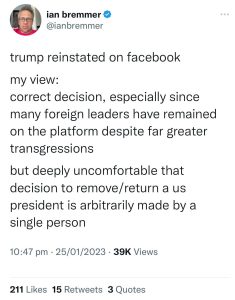In a controversial move last week, the Facebook and Instagram accounts of former President Donald Trump have been reinstated more than two years after he was banned for inciting violence when his supporters stormed the US Capitol on 6 January 2021. When he was barred, Trump’s account was the most followed on Facebook. The decision will allow him to regain access to hundreds of millions of followers across his Facebook and Instagram accounts.
According to a statement by Nick Clegg, president of global affairs at Facebook’s parent company Meta, Trump’s accounts will be restored “in the coming weeks” with new measures “to deter repeat offenses.” The “serious risk to public safety” that led Meta to suspend Trump in January 2021 “has sufficiently receded,” Clegg noted in a blog post. However, he said, Trump would face “heightened penalties” should he continue to break Meta’s rules, including removal of his posts and even a fresh two-year suspension.
“The public should be able to hear what their politicians are saying – the good, the bad, and the ugly – so that they can make informed choices at the ballot box. But that does not mean there are no limits to what people can say on our platform,” Clegg said. It seems that the exact reason Facebook pulled him is why they say they are letting him back. So, what has changed? You don’t reward someone for bad behavior by letting them back into the playpen.
Trump’s Twitter account was reinstated in November last year, where he had been barred since January 2021. Reinstatement of these accounts collectively gives the former president far more reach as he campaigns for the White House in 2024.
The suspension of Trump’s accounts was the most controversial and high-profile content moderation decision Meta has ever made. His reinstatement has ignited the contentious debate about the power tech platforms wield in determining who gets a voice online.
In a statement on Truth Social, the social platform financially backed by Trump, the former president said:
“FACEBOOK, which has lost Billions of Dollars in value since ‘deplatforming’ your favorite President, me, has just announced that they are reinstating my account. Such a thing should never again happen to a sitting President, or anybody else who is not deserving of retribution!”
Meta has been at the center of a debate over free speech online and where the power should rest on deciding what can be posted and what needs to be removed. The banning of Trump’s accounts was a glaring demonstration of the influence of social media platforms and their control over public discourse online.
Self-proclaimed “free speech absolutist” Elon Musk, CEO of Twitter, apparently considers free speech a license to allow misinformation and conspiracy theories to flourish unabated. Upon taking the helm of Twitter last fall, Musk granted amnesty to thousands of suspended accounts and annihilated the content moderation team, allowing bots, trolls, and hate speech to run amok — sometimes drowning out the voices of everyday users of the platform and sending advertisers running for the hills.
Whatever viewpoint “free speech” is filtered through, when distilled to its essence, seems to be: “Free speech is the right to say whatever social media owners or their monied influencers want you to say” — or worse, want you to hear. No matter how you look at it, this controversial debate is going to be around for a while. Influence will find ever more sophisticated ways to do just that – influence (see our article on artificial (virtual) influencers).
One thing is for certain, awareness of issues and their potential impact has never been more important in political and corporate circles. Listening is paramount. Gaining insights has never been easier. Analytic reports, social listening tools, sentiment analysis, and research is available to every comms professional smart enough to want them. After all, intelligence is only useful when we know what to do with it.
Social360 is an advanced social media monitoring company. For more information, please contact Alex Baker or Giles Brown or visit our website – www.s360group.com.

 Social Due Diligence
Social Due Diligence 
